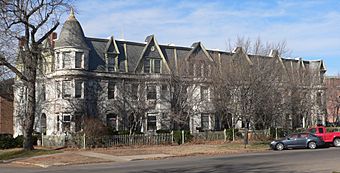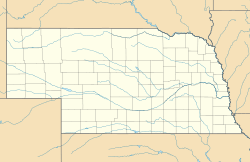Barr Terrace facts for kids
Quick facts for kids |
|
|
Barr Terrace
|
|

The building in 2012
|
|
| Location | 627–643 S. 11th, and 1044 H St., Lincoln, Nebraska |
|---|---|
| Area | less than one acre |
| Built | 1890 |
| Architect | Ferdinand C. Fiske |
| Architectural style | Châteauesque |
| MPS | Nineteenth Century Terrace Houses TR |
| NRHP reference No. | 79003688 |
| Added to NRHP | October 1, 1979 |
Barr Terrace is a historic building in Lincoln, Nebraska. It is a large row house, which means it's one of several homes built side-by-side in a row. It was built in 1890 for William Barr, who was an immigrant from Germany.
The building was designed in a special style called Châteauesque. This style makes buildings look like grand French castles! Barr Terrace has been an important landmark since October 1, 1979. That's when it was added to the National Register of Historic Places, a list of places important to American history. The building was also carefully restored in 1979 and 1980.
History of Barr Terrace
Barr Terrace was built in 1890. It was created for William Barr, a German immigrant who became a successful real estate investor. He first came to Lincoln in 1861, when the city was known as Lancaster. William Barr also owned another similar building called Lyman Terrace.
Building Design and Materials
This impressive building has three main floors. Below these floors, there is a basement made from rough, textured stones. This style of stone is called rusticated. The roof is a special kind called a mansard roof, which has slopes on all four sides. It was built using slate, a type of rock that splits into thin sheets. The window sills are made from sandstone.
The Barr Terrace was designed in the Châteauesque style. The architect was Ferdinand C. Fiske. He studied at Cornell University and designed many buildings in Nebraska. One cool feature of Barr Terrace is a small, round tower on its northern side. This type of tower is called a tourelle.
In 1890, a newspaper called the Nebraska State Journal wrote about Barr Terrace. They said that buildings like Barr Terrace were the start of a trend. They believed these "fine tenement residences" would make the city look more beautiful and important.
Restoration Efforts
By 1979, a man named James Brygger owned Barr Terrace. He had just finished studying architecture at the University of Nebraska–Lincoln. James bought the building with help from an investor because he wanted to restore it.
A newspaper article from 1980, in the Lincoln Journal Star, described his hard work. It said he "ripped, tore and pounded apart the interior." He removed the old, damaged walls, floors, and ceilings all by himself at first. The job was very big, so he hired other workers to help him. They built new cabinets and helped with other tasks.
After all this hard work, the building was restored to its former glory. It was then rented out to middle-class families. Barr Terrace was officially added to the National Register of Historic Places on October 1, 1979. This shows how important its history and architecture are.


